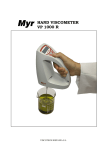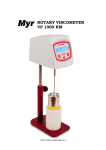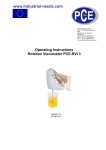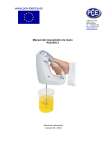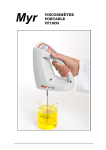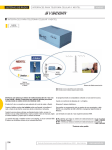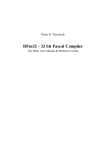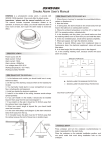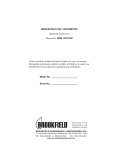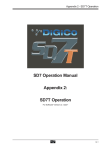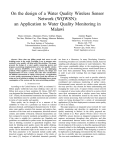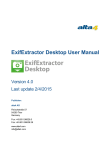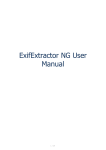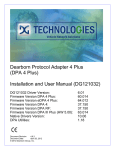Download PORTABLE VISCOMETER VP 1000 - Labo
Transcript
PORTABLE VISCOMETER VP 1000 VISCOTECH HISPANIA S.L. Viscotech Hispania S.L. would like to thank you for the purchase of this equipment and for your confidence in choosing our company. We are commited to offer you the best and most reliable service. Don’t hesitate to contact your local dealer for any question related to this viscometer. Your Viscotech Hispania S.L. team. User manual (Stand 1.02 - 01/10) Portable viscometer VP 1000 Series Contents 1 General information ..............................................................................1 1.1 Introduction ..............................................................................................1 1.2 Intended use ..............................................................................................1 1.3 Security symbols .......................................................................................1 1.4 Safety notes...............................................................................................2 1.5 Certification, warranty and documentation................................................3 2 Technical data.......................................................................................4 3 Setting up the viscometer .....................................................................5 3.1 Reception and unpacking of the instrument ..............................................5 3.2 Scope of delivered parts .............................................................................5 3.3 Setup .........................................................................................................6 3.4 Setting up the spindle................................................................................7 3.5 Setting up the spindle protector ................................................................8 3.6 Setting up the stand (optional)...................................................................9 4 Operation ............................................................................................10 4.1 Initial turn-on and configuration..............................................................10 4.2 Measurement ...........................................................................................11 5 About viscometer’s calibration ............................................................12 5.1 Viscometer's verification .........................................................................12 5.2 How to perform the “auto zeroing” function ............................................13 6 Accessories (optional) ..........................................................................13 7 About viscosity ...................................................................................14 7.1 Description ..............................................................................................14 7.2 Related concepts .....................................................................................14 8 Viscosity table.....................................................................................17 9 Problems and solutions .......................................................................18 PáginaPágina 0 Stand 1.02 – 01/10 Portable viscometer VP 1000 Series 1 General information 1.1 Introduction The VP 1000 Series of the MYR Group is a portable viscometer for the quick and flexible measurement of fluid viscosities. The ergonomic design of the viscometer and the stability of the (optional) stand allow the VP 1000 to be used both as portable or as lab viscometer. Viscometers of the VP 1000 Series are battery operated and work at a fixed speed ( 20, 30, 50 or 60 rpm). The low consumption of the unit makes it possible to work continuously for more than 24 hours without need to recharge or change the batteries. Speed selection must be set when ordering the viscometer according to the measurement range required by end user. Viscosity readings are delivered only in one unit: milli-Pascal-seconds (mPas). To achieve the whole measurement range, the viscometer is delivered with a set of different R spindles (R2 – R7, and optionally R1). The most outstanding feature of the portable viscometers of the VP 1000 Series is their user-friendliness. This characteristic makes them an ideal tool to carry out measurements in the own premises during the manufacturing process, in laboratories or in research centres whenever quick and reliable viscosity readings are needed. 1.2 Intended use The VP 1000 viscometer has been developed specifically to fulfill viscosity readings in all kinds of fluids. Only skilled or specially trained personnel must operate the viscometer. Everyone who works with the viscometer VP 1000 must strictly follow the security precautions and observe the safety rules of the laboratory. It is not allowed to operate the viscometer for any other purpose as the one described in this chapter. No right to claim warranty will be granted if any of the above norms are disregarded. 1.3 Security symbols Installation and operation of the VP 1000 viscometer are user-friendly and very easy if instructions of this manual are strictly followed. Be aware that any use of this equipment out of the scope described by the manufacturer may compromise the security of the operator. Besides this and in order to stress the points that may represent any risk both for the operator and the viscometer itself, this manual uses following symbols and messages: Stand 1.02– 01/10 Page 1 Portable viscometer VP 1000 Series DANGER Wherever this symbol, along with the message DANGER, appears in this manual, it indicates a potential personal injury hazard or damage on the viscometer. For your security, strictly observe instructions provided. CAUTION Wherever this symbol, along with the message CAUTION, appears in this manual, it indicates that damages on the viscometer may occur if instructions are not observed. For the proper operation of the equipment, instructions must be strictly observed. INFORMATION This symbol refers to specific details of the viscometer which must be specially considered because of their relevance. Apart from the instructions contained in this manual, everyone who operates the portable viscometer of the VP 1000 series is obliged to know and observe the security and hygienic measures of the laboratory where this device is operated. Everyone who should operate and set up the viscometer must have completely read and understood these instructions before starting the operations. 1.4 Safety notes Operator security may be at risk if instructions of this manual are not observed. Please observe the following general precautions during operation of this instrument. Failure to comply with these precautions violates safety standards and the intended use of the instrument. Viscotech Hispania, S.L. is not liable for misuse of the instrument and failure to comply with basic safety requirements. Battery operated The viscometer works with batteries. It is strictly forbidden to remove the instrument hood during operation. Component changes and settings must only be fulfilled by specialized personnel. Use only original spare parts when changing any component. Battery replacement must be carried out after switching off the unit and removing the spindle from the shaft. Danger in explosive environment The instrument must not be operated in the presence of flammable gases. It is also forbidden to expose the instrument in environments where dangerous gas concentrations may occur. Page 2 Stand 1.02 – 01/10 Portable viscometer VP 1000 Series Hazard of malfunction To avoid damages on the instrument, it must be only operated in a controlled electromagnetic environment. According to this, transmitters such as mobile phones must not be operated near to it. In case of malfunctions and/or service work, please turn off the instrument and contact your local dealer. 1.5 Certification, warranty and documentation Certification Viscotech Hispania, S.L. certifies that this instrument has been tested and checked carefully. Its technical data has been verified before shipment to be in accordance with the published specifications. The instrument complies with applicable international safety regulations. Warranty This MYR product is warranted against defects in material and workmanship for a period of 2 (two) years. Parts which prove to be defective during the warranty period will be repaired or replaced free of charge. No other warranty is expressed or implied. Unauthorized modification or repair by third party persons will void the warranty. The warranty will expire in case of improper or wrong use of the instrument and in case the warning and precautionary messages are not observed. Viscotech Hispania, S.L. is not liable for any occurring damage. Once the warranty period has expired, we recommend to sign a service contract in order to guarantee the perfect functionality of the instrument. For more information on this subject, please contact your local dealer. Documentation This user manual will be delivered together with each instrument. Further copies can be ordered at the local dealer by giving the serial number of the instrument, the number of the user manual and the date of issue. This user manual is available in the following languages: English and Spanish. Errors and omissions excepted. Subject to amendment and improvement without further notice. Manufacturer VISCOTECH HISPANIA, S.L. Vidriers 21 43700 El Vendrell SPAIN Tel. + 34 977 66 80 20 Fax + 34 977 66 80 30 viscotech.myr.com.es www.myr.com.es Stand 1.02– 01/10 Page 3 Portable viscometer VP 1000 Series 2 Technical data Portable viscometer VP 1000 Series Power requirements Batteries capacity Batteries autonomy Alkaline batteries 4x AA/LR6 Rechargeable batteries 4 x AA/R6 Alkaline: 1.900 mAh Rechargeable: 2.500 mAh 24-30 hours under continuous operation Displayed data fixed rpm (20 rpm, 30 rpm, 50 rpm or 60 rpm) selected spindle (R2 – R7). Optional: R1 dynamic viscosity (mPas) full scale percentage max. reading scale battery level indicator Compatibility 100% compatible with Brookfield method Spindles standard spindle set (R2-R7) optional: R1 Speeds 20 rpm 30 rpm 50 rpm 60 rpm (just one speed set by default) Viscosity ranges (with standard spindle) Accuracy Repeatability ± 2% of full scale ± 1% Measurements Weight 10,5 x 16 x 25,5 cm 1.150 g Model Model Model Model VP1020: VP1030: VP1050. VP1060: 200 130 80 66 – 200.000 mPas – 133.300 mPas – 80.000 mPas – 66.600 mPas Operating conditions: from +10°C until +40°C (at a max. rel. humidity of 80% without condensation) altitude up to 2000 m M.S.L. for indoor use only. Pollution degree: 2 Protection category: IP 20 Page 4 Stand 1.02 – 01/10 Portable viscometer VP 1000 Series 3 Setting up the viscometer 3.1 Reception and unpacking of the instrument Follow these steps after receiving the instrument: Please check carefully the packaging box of the viscometer before removing it in order to find out transportation damages. Should the packaging box be broken or have suffered any other damage, please contact the shipping agency before opening it. Once you have taken the instrument out of the box, check if damages can be observed. Should this be the case, please inform the dealer that has delivered you the equipment. Remove all packing straps, protectors and accessories used during transport. Recyclable materials are to be disposed in the containers provided therefore. 3.2 Scope of delivered parts Portable rotational viscometer of the VP 1000 series Standard spindle set (R2 – R7) Spindle protector Setup tool 4 alkaline additional batteries AA/LR6 (6V) Stand 1.02– 01/10 Page 5 Portable viscometer VP 1000 Series 3.3 Setup Portable viscometers of the VP 1000 Series are battery operated. The basic delivery scope comprises 4 alkaline batteries 4xAA/LR6 (6V) installed in the unit and 4 additional batteries for replacement. The unit can work both with alkaline batteries from type AA/LR6 and with rechargeable ones from type AA/R6. In continuous operation, batteries have a lifespan of 24 to 30 hours. Battery level is indicated on the display by means of a symbol. VP 1060 v1.02 Batteries are positioned on the lower side of the viscometer (fig. 3). To replace them, proceed as follows. fixing screw Il. 3 Remove the screw as indicated in the illustration Remove the cover plate of the battery housing and replace the batteries. Please pay attention to the correct polarity when doing this operation. To replace the cover in its original place, insert first the cover tongue and tighten the screw again. On the cover plate there is a label with the most relevant features of the viscometer. Page 6 Stand 1.02 – 01/10 Portable viscometer VP 1000 Series 3.4 Setting up the spindle Apart from R7, all spindles included in the standard set are disc spindles. Because of this shape, spindles must be smoothly immersed into the fluid to avoid bubble formation below the surface. To assemble the spindle, hold firmly the pivot shaft with one hand and screw up the spindle onto it using the other hand. To screw up the spindle, turn it in the direction shown in the illustration on the left. Once it has been inserted, submerge the spindle into a fluid until it reaches the notch that indicates the top immersion level allowed. In doing so, please take care not to hit neither the spindle nor the pivot shaft with the vessel to avoid distortion of spindle perpendicularity. Be very careful when you perform this operation in order to prevent the spindle from bending or the pivot shaft from suffering damages. Both the spindle and the screw must be in perfect conditions and extremely clean. R7 spindle must be immersed up to the middle mark included in the shaft recess. Spindles are made of stainless steel. Each spindle carries the reference name on its head. Stand 1.02– 01/10 Page 7 Portable viscometer VP 1000 Series 3.5 Setting up the spindle protector In order to protect the most sensitive components of the viscometer –the spindle and the pivot shaft– from impacts, the portable viscometer of the VP 1000 Series is delivered with a protection cylinder. This element allows also to perform measurements limiting the quantity of fluid to the volume that the cylinder can contain. Thanks to this element results are more accurate and measurements can be taken without holding the unit, as the cylinder fits perfectly into a 800 ml beaker. 3. upper disc 1. separating shaft The setup of this component is very simple. Follow the instructions indicated below and compare explanations with the illustration on the left side. 2. protection cylinder Screw the separating shafts (il. 4.1) into the upper holes of the cylinder protector (il. 4.2). Join the structure with the upper disc (il. 4.3) using the three screws included in delivery. Il. 4 Once the spindle protector has been assembled, it must be attached to the viscometer. Insert the pivot shaft of the viscometer very carefully onto the upper disc of the protector as indicated in the illustration. With the hex key included in the delivery set, tighten the screws as indicated in order to fix the protector with the pivot shaft of the viscometer. Check how to make this step looking at illustration 5. This operation should be realized very carefully to prevent impacts on the spindle or damages on the pivot shaft. After setting up the protector, the portable viscometer VP 1000 can remain in upright position without having to hold it. Insert the spindle in the pivot shaft as describe before. Instrument is now ready to operate. Il. 5 Page 8 Stand 1.02 – 01/10 Portable viscometer VP 1000 Series 3.6 Setting up the stand (optional) Proceed as follows: Insert the bar into the base hole as illustration beside indicates. Tighten the star knob to fix the bar onto the base . Insert the viscometer support into the bar. Use the other hand to turn the knob and place the support at the desired height. After setting up the stand, place the viscometer on it as illustration shows This operation should be carried out very carefully to prevent impacts on the spindle or damages on the pivot shaft Insert carefully the viscometer through the opening When the pivot shaft is inside the support, pull gently the unit down in order to fix it onto the support. Tighten firmly the viscometer to the support with the screws delivered using the hex key. Insert the spindle into the pivot shaft. The viscometer is now ready for operation. As the viscometer stand is not equipped with regulating feet, the surface where the instrument is placed must be perfectly levelled. Stand 1.02– 01/10 Page 9 Portable viscometer VP 1000 Series 4 Operation 4.1 Initial turn-on and configuration VP 1000 The configuration of the VP 1000 viscometer is very simple, because the only parameter that can be modified refers to the spindle. The information on the display can be modified using the ENTER button and the two arrows c (up) and d (down). ENT ER Initial turn-on and configuration Turn on the viscometer by pressing for an extended time (between 6 and 10 seconds) the ENTER button. After that, an introductory display with a symbol of the battery state appears. VP 1060 v1.02 Shortly afterwards, you can view the main display with the configuration that was last used with the viscometer. Rpm STOP mPas 0 R7 0,0 % The display includes the following information: speed (rpm), measurement unit (mPas), spindle type (R1 – R7) and full scale range. As mentioned in chapter 1, the viscometer works always at one speed (rpm) –20, 30, 50 or 60 rpm–, that can be selected when ordering the unit, and one unique measurement unit: milli Pascal seconds (mPas). The only parameter that can be modified is the spindle. Should you carry out measurements with a different spindle as the one that appears on the display, follow these steps to modify the information: Press shortly any one of the arrows (c or d). In doing so, the display will show following information: Spindle R7 6666mPas The spindle reference last used flashes on the display. At the right side, you can see the full scale range corresponding to the selecetd combination of speed and spindle. Page 10 Stand 1.02 – 01/10 Portable viscometer VP 1000 Series The full scale range refers to the maximum viscosity reading that the viscometer can achieve with selected combination of speed and spindle. This value helps the user to select the correct spindle according to the viscosity of the sample that must be analyzed. Use the arrows (c or d) to set the correct spindle type between R1 and R7. When the correct type appears on the display, press ENTER to validate. After that, the main display appears again with the new modification introduced. If by any reason you omit to press ENTER during 15 seconds when modifying the spindle, the viscometer returns automatically to the main display and will accept the last spindle selected. It is therefore very important to check that the spindle that has been set up in the viscometer matches with the one that is being showed on the display. 4.2 Measurement Measurement start To start the spindle rotation and trigger the measurement, press simply ENTER. The spindle beginns to rotate and the display delivers following data: speed (20, 30, 50 or 60 rpm) , spindle reference, viscosity readings (in mPas) and full scale percentage. During measurement, especially if carried out without stand, viscometer should be hold firmly and in upright position (check that bottom metal sheet of viscometer is parallel to the working surface) to avoid erroneous measurements. Out of reading's range If following display appears during the measurement process, you have exceeded the maximum reading's limit (overrange). In this case, change the spindle and insert a different one having a lower reference. Rpm mPas --------- Finish of measurement ---- R7 ---% To finish the measurement process, press ENTER again to stop the drive. The measurement result along with the full scale percentage will remain on the display. To start another measurement, proceed as described before. Stand 1.02– 01/10 Page 11 Portable viscometer VP 1000 Series Turn off the viscometer Press the ENTER key for an extended time to turn off the viscometer. By doing this, following information appears on the display. Power Off Shutting Down Don't forget to switch off the instrument (by pressing for a few seconds the ENTER button) when you have finished the measurements. Otherwise, the viscometer will remain active and batteries will run out. 5 About viscometer’s calibration The instrument delivered has been calibrated with standard calibration Newtonian oils by the manufacturer before shipping. We recommend carrying out calibrations on a regular basis according to operation frequency. For the correct calibration of the viscometer, please contact your local dealer. 5.1 Viscometer's verification We recomend to check the proper functionallity of the viscometer on a regular basis using Newtonian viscosity standards. According to the model, the standards suggested are as follows: Viscometer model viscosity standard (mPas) VP 1020 approx. 5.000 VP 1030 approx. 5.000 VP 1050 approx 2.500 VP 1060 approx. 2.500 When carrying out the verification, the value on the display should correspond with the one indicated in the certification of the standard oil, considering also the allowances (viscometer's accuracy + standard accuracy) involved. Due to the great influence that temperature has on viscosity measurements, we strongly recommend to perform the viscometer's verification test with the oil at the temperature specified in the oil certification. Page 12 Stand 1.02 – 01/10 Portable viscometer VP 1000 Series 5.2 How to perform the “auto zeroing” function If after turning on the viscometer and initiating the rotation of the spindle without immersing it in a fluid, the reading on the display does not indicate 'zero', you should proceed as follows: Turn on the viscometer by pressing for a few seconds the ENTER button. You will enter the introductory display where a symbol indicates the battery level. Press now the down arrow d and ENTER consecutively in order to access to the Auto zero option After this, following information appears on the display Options AutoZERO Press ENTER to enter the following screen Remove Spindle Press <ENTER> Don't forget that the "Auto zeroing" option must be carried out without spindle. It's also strongly advisable to fulfill this operation with the viscometer placed on the stand and not holding it with one hand. Should this not be possible, the viscometer has to be held in upright position (see details in page 11 of this manual) . Press ENTER to start the “Auto zero” process which will allow you to modify the "zero" value. During this process, following message appears on the display AutoZERO wait…. When the process has successfully finished, the display will automatically change to the main information and to the measurement mode 6 Accessories (optional) Battery charger R6 AA/Ni-Cd/Ni-Mh Rechargeable batteries Stand Special spindle R1 Spindle rack Newtonian certified calibration oils (600 ml) Stand 1.02– 01/10 Page 13 Portable viscometer VP 1000 Series 7 About viscosity 7.1 Description Myr viscometers of the VP 1000 Series are rotational and portable viscometers that determine the viscosity of a wide range of fluids. The measurements are performed according to the Brookfield method; the results obtained with the VP 1000 Series can therefore be perfectly compared to those gained with other equipment working also with the Brookfield method. The principle applied by this viscometer is equivalent to that of the rotational viscometers: a (disc or cylindrical) spindle, immersed in the sample to analyze, measures the torque required to rotate in the fluid. The torque value specified by the viscometer is based on the rotational speed and on the spindle geometry; this method allows to obtain a direct viscosity value in mPas Depending on the viscosity, the resistance exerted by a fluid opposing the motion of a spindle varies proportionally to the speed or size of the spindle. The viscometer has been calibrated to deliver readings in mPas, according to speed and spindle type used. The combination of the different spindle types allows to obtain optimal readings within the scale of each model of the portable viscometer series (VP 1020, VP1030, VP1050 and VP1060). 7.2 Related concepts Viscosity Viscosity is a distinctive property of the fluids. It is the measure of internal friction of a fluid when a layer of this fluid is forced to move in relation to another layer. Viscosity is a value highly dependant on temperature. The standard units for dynamic viscosity measurements are mPa.s (S.I) or cP (C.G.S). 1mPas=1cP (centi-Poise) 1 dPas= 100 mPas 1dPas=1P (poise) Laminar flow It is the ideal movement between layers without transfer of mass from one to the other. It is the base to calculate dynamic viscosity. Turbulent flow: There is a certain speed from which a transfer of mass between layers occurs. Result is an apparently greater shear stress and an erroneously high viscosity reading. Turbulent flow is characterized by a sudden and notorious increase in viscosity above a certain speed. Newtonian fluids: Viscosity in Newtonian fluids at a given temperature, remain constant regardless of viscometer model, spindle and speed being used. The most common Newtonian fluids are water and thin motor oils. Page 14 Stand 1.02 – 01/10 Portable viscometer VP 1000 Series Non-Newtonian fluids: This kind of fluids do not show a lineal relation between shear stress and shear rate. Different working conditions have as a result different viscosity values. Apparent viscosity is defined as the result of a fluid analysis. This result can be reproduced in another viscometer only if analysis is carried out maintaining identical working conditions and following a defined working process. Variables below influence results: − Viscometer model − Dimensions of sample container − Filling level − Sample temperature − Spindle − Rotating speed − Spindle protector, yes or not. − Duration of test (time dependant fluids) Generally speaking each modification in the working method and working process will indefectibly lead to variations in final analysis results. There are different behaviors within the non-Newtonian fluids: Pseudoplastic: Samples whose viscosity decreases when increasing shear rate. It is also called “shearthinning” flow behavior. Most common pseudoplastic fluids are coatings, milk, ink and jam. Plastic: Under static conditions they might have a similar behavior to a solid. For a correct evaluation of the fluid it is necessary to reach the “yield value” to make fluid flow so that product later shows any of the possible material characterizations: Newtonian, pseudoplastic or dilatant. Examples: toothpaste, chocolate, grease. Dilatant: Viscosity of dilatant fluids increases when shear rate increases. It is also called “shearthickening” flow behaviour. Examples: solutions of sugar and water and mixtures of sand and water. Time dependent fluids Viscosity of dilatant fluids increases when shear rate increases. It is also called “shearthickening” flow behaviour. Thixotropic Those fluids in which viscosity and shear stress decrease, maintaining a constant shear rate, with time. Ketchup, honey, anti-drop paints, mayonnaise . Rheopeptic Those fluids in which viscosity and shear stress increase, maintaining a constant shear rate, with time. Lubricants and some paints types are rheopeptic fluids. Stand 1.02– 01/10 Page 15 Portable viscometer VP 1000 Series Reference substances and viscosities Page 16 Substance Approx viscosity. (mPas) Motor oil SAE 10 65 Olive oil 84 Coatings (airbrushed) 100 Yogourt 150 Sugar solution 70% 400 Lubricating oil 50 – 1.000 Concentrated juice 1.500 Inks 550 – 2.200 Honey 10.000 Nanocellulose ( common additive) 8.000 – 10.000 Toothpaste 100.000 Stand 1.02 – 01/10 Portable viscometer VP 1000 Series 8 Viscosity table spindle R1 optional Model R2 R3 R4 R5 R6 R7 viscosity in mPas VP1020 500 2.000 5.000 10.000 20.000 50.000 200.000 VP1030 333 1.300 3.300 6.600 13.300 33.300 133.000 VP1050 200 800 2.000 4.000 8.000 20.000 80.000 VP1060 166 660 1.600 3.300 6.600 16.600 66.600 Viscosity ranges (with standar spindles) (between 10% - 100% of full scale): Model Model Model Model VP1020: VP1030: VP1050. VP1060: Stand 1.02– 01/10 200 – 200.000 mPas 130 – 133.300 mPas 80 – 80.000 mPas 66 – 66.600 mPas Page 17 Portable viscometer VP 1000 Series 9 Problems and solutions Problem Solution The viscometer does not work • Check the battery level The instrument does no read 'zero' without fluids • Carry out the “Autozero” function Viscosity speed is unstable and inaccurate • Check if you hold firmly the viscometer • Check if the spindle disk rotates steadily • Check if the sample temperature is stable • Check the rheological features of the sample that must be analized Page 18 Stand 1.02 – 01/10






















